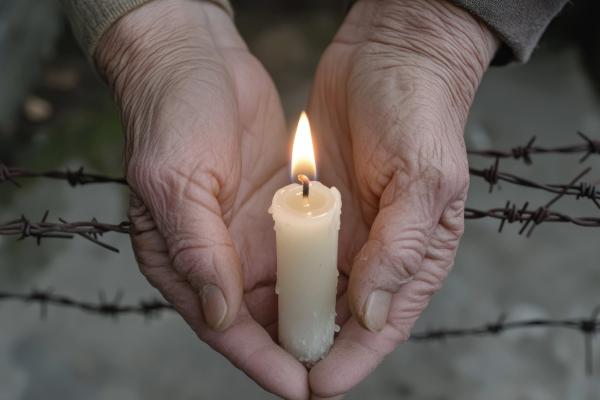July 2015--
When the Arab nations invaded Israel in 1948, they instructed Palestinians living in the newly created Jewish state to flee their homes to neighboring countries. Most expected Israel to be quickly defeated. “You’ll be home in a week,” many were told. When the war to destroy Israel proved unsuccessful, tens of thousands were left as refugees. Rather than absorb them into their own populations, Israel’s Arab neighbors maintained these people in perpetual refugee status. Seven decades later, many of these people and their descendants still live in “temporary” camps.At a 1964 Arab League summit in Cairo, a new group dedicated to the “liberation of Palestine” through armed struggle, the Palestine Liberation Organization (PLO), was formed. Its original charter stated that “Palestine with its boundaries that existed at the time of the British Mandate is an indivisible territorial unit.” One cannot comprehend current events in the Middle East without understanding this background.The core issue is not borders, refugees, or territories assigned by mandates or won through war. The issue is the very existence of Israel. The Palestinian National Charter of 1964 says, “The claims of historic and spiritual ties between Jews and Palestine are not in agreement with the facts of history.” Further, the bulk of the Palestinian Charter clearly describes the “sacred” responsibility of the Palestinian Arabs and the Arab world to engage in “armed struggle” toward the “elimination of Zionism” to “liberate Palestine.” This charter, which rejects Israel’s right to exist, has never been changed. In the Arab view, this is not about two states living side by side in peace; it is about one state only, called “Palestine.”At the time the PLO was created, the territories under dispute today—the Gaza Strip and the West Bank—were under the control of Egypt and Jordan, respectively. Yet neither nation was willing to allow “their” lands to be used for a Palestinian homeland. Only after the 1967 war, when Israel captured those regions, did they become necessary for a Palestinian state.The man most closely identified with the PLO was Yasser Arafat, an Egyptian who ran the organization with an iron first from 1969 until his death in 2004. Over that 35-year period, he was personally responsible for the deaths of thousands of Jews and Palestinians as well as amassing apersonal fortune in the billions. His corrupt reign was a disaster for the Palestinian people, but he continues to be revered as a hero.The PLO was a terrorist organization from the beginning. The event that first brought them to public consciousness around the world was the 1972 attack on Israeli athletes at the Munich Olympic Games by the Black September wing of the PLO. Eleven Israeli coaches and athletes were murdered in the initial raid and the subsequent botched rescue attempt of the survivors.Though Arafat supposedly spoke for the Palestinian people, he was unpopular with Arab leaders. King Hussein of Jordan expelled him in a series of bloody armed struggles in 1970-1971 after the PLO was linked to attempts to assassinate him. It is estimated that up to 5,000 people died in those battles. Following his ouster, Arafat set up operations in Lebanon, from which he continued to launch attacks against Israel.In 1982 the Israeli army invaded southern Lebanon to destroy the bases the PLO was using to strike Israel. The PLO was armed with thousands of missile and rocket launchers and was striking northern Israel with artillery fire almost daily. The Israeli army quickly drove the PLO out of their positions in southern Lebanon and surrounded them in Beirut. When the Syrian air force tried to intervene, the Israeli Air Force shot down more than 80 Syrian planes without suffering a single loss of their own.The United States stepped in and brokered a ceasefire and right of passage agreement, which allowed Arafat and his fighters to relocate to Tunisia. Arafat remained there until 1993. He continued to call for a Palestinian state and to support terrorist activity, but he also launched a diplomatic initiative to gain recognition and funding from the world community.Following the Oslo Accords of 1993, Arafat returned to the West Bank, where he established his headquarters in Ramallah. In 1994 Arafat shared the Nobel Peace Prize with Israel’s Prime Minister Yitzhak Rabin and President Shimon Peres for the peace treaty. Among the obligations of the treaty, the Palestinians were to recognize Israel’s right to exist and put an end to violence. In return, there would be a gradual transition to Palestinian self-rule. Arafat and the PLO never changed their charter to recognize Israel’s legitimate right to exist as he promised he would, nor did they end the violence.Arafat’s obsession with the complete destruction of Israel was demonstrated at the Camp David peace talks held by President Clinton in 2000. Israel’s Prime Minister, Ehud Barak, offered to give Arafat all of Gaza, 94% of the West Bank and most of Jerusalem. It was a much larger concession than anyone expected, but to the shock and amazement of those present, including Mr. Clinton, Arafat turned down the deal.Arafat continued to play both sides of the fence, convincing Western leaders that he was committed to peace while simultaneously continuing to orchestrate terrorist attacks against Jewish civilian andmilitary targets. Arafat successfully used his credentials as a peacemaker to solicit billions in aid from the West. Despite all the funds that were sent to improve the lives of Palestinians, most of the people continued to live in abject poverty. Arafat claimed that the Palestinian Authority was bankrupt, yet a General Accounting Office study run by the United States indicated he had diverted perhaps $10 billion to Swiss accounts under his personal control.Arafat fell ill in 2004 and died while being treated in Paris. He was followed in office by Mahmoud Abbas (also known as Abu Mazen) who continues as President of the Palestinian Authority despite the fact that his term of office expired in 2009 and no subsequent elections have been held. Abbas was personally involved in financing the Black September Munich raid in 1972, though he denies knowing for what purpose the funds would be used.The question of the future of the Palestinians was set in motion more than 60 years ago when they and the Arab nations of the Middle East rejected the United Nations plan to create Israel and launched a war to destroy the Jewish state. Today they remain a people without a country, and most of them are still committed to the eventual annihilation of Israel.











